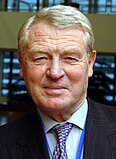1995 United Kingdom local elections
| |||||||||||||||||||||||||||||
All 36 metropolitan boroughs, all 14 unitary authorities, all 274 English districts, 29 out of 32 Scottish council areas and all 22 Welsh principal areas | |||||||||||||||||||||||||||||
|---|---|---|---|---|---|---|---|---|---|---|---|---|---|---|---|---|---|---|---|---|---|---|---|---|---|---|---|---|---|
| |||||||||||||||||||||||||||||
 Colours denote the winning party, as shown in the main table of results. | |||||||||||||||||||||||||||||
The 1995 United Kingdom local elections took place on Thursday 6 April 1995 in Scotland, and Thursday 4 May 1995 in England and Wales.[1][2] The Conservative Party lost over 2,000 councillors in the election, while the Labour Party won 48% of the vote, a record high for the party in local elections.[3]
The elections were the first to be contested under Labour's new leadership of Tony Blair, who had been elected the previous year following the sudden death of his predecessor John Smith.
This was also the first election of 22 Welsh and 14 English unitary authorities, creating shadow authorities which ran in parallel with existing councils until taking power in April 1996, except for the new Isle of Wight Council which took power immediately.[4]
England
[edit]Metropolitan boroughs
[edit]All 36 metropolitan borough councils had one third of their seats up for election.
Unitary authorities
[edit]These were the first elections to the first 14 unitary authorities established by the Local Government Commission for England (1992). They acted as "shadow authorities" until 1 April 1996.
| Council | Previous control | Result | Details | ||
|---|---|---|---|---|---|
| Bath and North East Somerset ‡ | New Council | No overall control | Details | ||
| Bristol | New Council | Labour | Details | ||
| East Riding of Yorkshire ‡ | New Council | No overall control | Details | ||
| Hartlepool | New Council | Labour | Details | ||
| Isle of Wight ‡ | New Council | Liberal Democrats | Details | ||
| Kingston upon Hull | New Council | Labour | Details | ||
| Middlesbrough | New Council | Labour | Details | ||
| North East Lincolnshire ‡ | New Council | Labour | Details | ||
| North Lincolnshire ‡ | New Council | Labour | Details | ||
| North Somerset | New Council | No overall control | Details | ||
| Redcar and Cleveland | New Council | Labour | Details | ||
| South Gloucestershire ‡ | New Council | No overall control | Details | ||
| Stockton-on-Tees | New Council | Labour | Details | ||
| York ‡ | New Council | Labour | Details | ||
‡ New ward boundaries from predecessor authorities
District councils
[edit]Whole council
[edit]In 167 districts the whole council was up for election.
These were the last elections to the district councils of Blackpool, Bournemouth, Bracknell Forest, Darlington, Leicester, Luton, Newbury, Nottingham, Plymouth, Poole, Rutland, The Wrekin, Torbay, Warrington and Windsor and Maidenhead before they were made unitary authorities by the Local Government Commission for England (1992).
These were also the last elections to the district councils of Hove and Rochester-upon-Medway before they were abolished and replaced by unitary authorities by the Local Government Commission for England (1992).
Third of council
[edit]In 107 districts one third of the council was up for election.
These were the last elections to the district councils of Derby, Milton Keynes, Portsmouth, Southampton, Stoke-on-Trent and Thamesdown before they were made unitary authorities by the Local Government Commission for England (1992).
These were also the last elections to the district council of Brighton before it was abolished and replaced by a unitary authority by the Local Government Commission for England (1992).
Scotland
[edit]These were the first elections to the 29 council areas established by the Local Government etc. (Scotland) Act 1994.
†Council was renamed shortly after election.
Wales
[edit]These were the first elections to the 22 principal areas established by the Local Government (Wales) Act 1994.
| Council | Previous control | Result | Details | ||
|---|---|---|---|---|---|
| Aberconwy and Colwyn† | New Council | No overall control | Details | ||
| Anglesey† | New Council | Independent | Details | ||
| Blaenau Gwent | New Council | Labour | Details | ||
| Bridgend | New Council | Labour | Details | ||
| Caernarfonshire and Merionethshire† | New Council | Plaid Cymru | Details | ||
| Caerphilly | New Council | Labour | Details | ||
| Cardiff | New Council | Labour | Details | ||
| Cardiganshire† | New Council | Independent | Details | ||
| Carmarthenshire | New Council | No overall control | Details | ||
| Denbighshire | New Council | No overall control | Details | ||
| Flintshire | New Council | Labour | Details | ||
| Merthyr Tydfil | New Council | Labour | Details | ||
| Monmouthshire | New Council | Labour | Details | ||
| Neath and Port Talbot† | New Council | Labour | Details | ||
| Newport | New Council | Labour | Details | ||
| Pembrokeshire | New Council | Independent | Details | ||
| Powys | New Council | Independent | Details | ||
| Rhondda Cynon Taf | New Council | Labour | Details | ||
| Swansea | New Council | Labour | Details | ||
| Torfaen | New Council | Labour | Details | ||
| Vale of Glamorgan | New Council | Labour | Details | ||
| Wrexham | New Council | Labour | Details | ||
†Council was renamed shortly after election.
References
[edit]- ^ Rallings, Colin; Thrasher, Michael. Local Elections Handbook 1995 (PDF). Local Government Chronicle Elections Centre. Retrieved 3 May 2016.
- ^ "Council compositions". The Elections Centre. Retrieved 3 May 2016.
- ^ White, Michael (5 May 1995). "Tories buried in a landslide More than 2,000 seats lost as Labour reaps record poll and Lib-Dems surge". The Guardian. p. 1.
- ^ Rob Clements (10 May 1995). "The local elections of 4 May 1995". House of Commons Library. Research Paper 95/59. Retrieved 3 September 2011.



